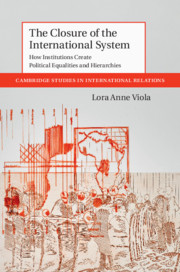 The Closure of the International System
The Closure of the International System International Organizations between Sovereign Equality and Inequality
Published online by Cambridge University Press: 16 June 2020
This chapter asks how do international institutions adjust to changes in the number, diversity, and relative power of system members? It combines the Weberian concept of social closure and the idea of club goods to argue that, as IOs come under pressure to open up to new and more heterogenous members, the logic of closure creates incentives for incumbent members to create institutional designs that preserve their privileges. In the face of membership diversity, rules that promote procedural equality—i.e., consensus and majority voting rules—challenge status quo interests. In response, incumbents pursue designs that preserve clubs of like-minded actors through assimilative, hierarchical or exclusive multilateralism. The chapter discusses how self-determination, the principled basis for membership expansion, serves as a rule of closure. Then it considers the cases of the United Nations at its founding, the United Nations during its main period of expansion under demands for a New International Economic Order, and the G20, which many have pointed to as a new model of inclusive governance. Each case shows how expanding institutional membership may improve formal equality while triggering a decrease in procedural equality, creating institutional arrangements in which all are equal, but some are more equal than others.
To save this book to your Kindle, first ensure [email protected] is added to your Approved Personal Document E-mail List under your Personal Document Settings on the Manage Your Content and Devices page of your Amazon account. Then enter the ‘name’ part of your Kindle email address below. Find out more about saving to your Kindle.
Note you can select to save to either the @free.kindle.com or @kindle.com variations. ‘@free.kindle.com’ emails are free but can only be saved to your device when it is connected to wi-fi. ‘@kindle.com’ emails can be delivered even when you are not connected to wi-fi, but note that service fees apply.
Find out more about the Kindle Personal Document Service.
To save content items to your account, please confirm that you agree to abide by our usage policies. If this is the first time you use this feature, you will be asked to authorise Cambridge Core to connect with your account. Find out more about saving content to Dropbox.
To save content items to your account, please confirm that you agree to abide by our usage policies. If this is the first time you use this feature, you will be asked to authorise Cambridge Core to connect with your account. Find out more about saving content to Google Drive.